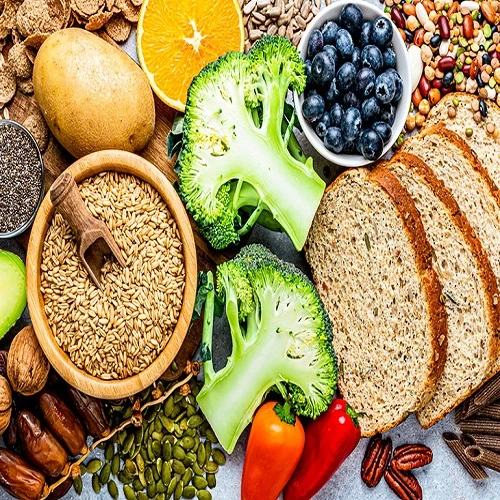The Benefits of Dietary Fiber

Dietary fiber is an essential part of our diet and is vital to our overall health. Vegetables, fruits, whole grains, and legumes are rich sources of dietary fibers, which are the non-digestible components of plant foods. Below we review the benefits of dietary fiber and its importance to our health.
The benefits of dietary fiber
Improve digestive health:
Dietary fiber is one of the best ways to improve digestive health. Dietary fiber promotes bowel movements and increases stool volume, making it easier to pass stools and helping prevent constipation. Soluble fiber also coats the intestinal walls and encourages the growth of beneficial bacteria in the digestive tract.
Regulating blood sugar levels:
Dietary fiber plays an essential role in regulating blood sugar levels. They help slow the absorption of sugar in the digestive system and improve the body's response to insulin. As a result, eating dietary fiber can help prevent type 2 diabetes and help people with it better manage their blood sugar levels.
Improve heart health:
Dietary fiber is part of a heart-healthy diet. Dietary fiber helps lower levels of harmful cholesterol in the blood, thus reducing the risk of cardiovascular disease. Dietary fiber also lowers blood pressure and improves blood vessel function.
Satiety and weight management:
Dietary fiber plays a vital role in feeling full and managing weight. Dietary fiber absorbs water and expands in the stomach, creating a feeling of fullness and satiety for extended periods. As a result, it prevents excessive appetite and helps maintain a healthy weight.
Chronic disease prevention:
Dietary fiber is an essential part of the diet that can contribute to the prevention of many chronic diseases, such as obesity, heart disease, diabetes, and colon cancer. Dietary fiber contributes to this by improving digestion and absorption and reducing gastrointestinal inflammation.
Prevention of colon and irritable bowel diseases:
Research indicates that an adequate intake of dietary fiber can contribute to the prevention of colon disease and Irritable Bowel Syndrome. Fiber helps stool move quickly through the intestines, which reduces the risk of colon cancer and other colon conditions. Dietary fiber also improves irritable bowel syndrome and relieves associated symptoms.
Sources rich in fiber
Dietary fiber is essential to maintaining a healthy body. Dietary fiber comes from vegetables, fruits, whole grains, and legumes. Therefore, dietary fiber must be included in the daily diet in sufficient quantities to benefit from its health benefits.
Dietary fiber exists in many plant foods. Here are some high-fiber sources:
- Vegetables: Most vegetables contain high levels of fiber, such as broccoli, spinach, carrots, sweet potatoes, and peas.
- Fruits: Fresh and dried fruits are excellent sources of fiber, such as apples, melons, bananas, berries, and dates.
- Whole grains: Whole grains are an essential source of fiber, such as oats, whole wheat, brown rice, barley, and yellow corn.
- Legumes: Legumes such as beans, lentils, chickpeas, and beans contain high levels of fiber.
- Nuts and seeds: Nuts and seeds are rich sources of fiber, as are almonds, cashews, hazelnuts, quinoa, flax, and chia.
- Whole-grain products: Fiber is found in whole-grain products such as whole-grain bread, pasta, and fortified oatmeal.
Dietary fiber intake must be increased gradually, and sufficient amounts of water should be drunk to ensure the efficacy of fiber in the digestive system. In addition, it is recommendable to eat a variety of sources of fiber, such as vegetables, fruits, whole grains, and legumes, to take full advantage of the health benefits of dietary fiber.
Authors
 English
English
 العربية
العربية

Add New Comment